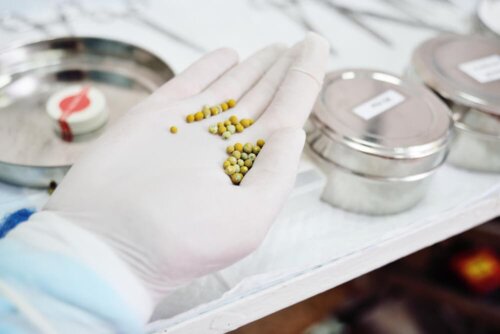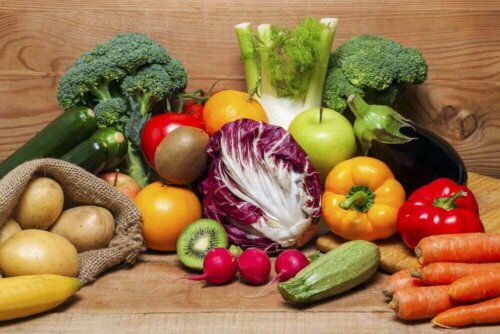The Best Diet if You Suffer from Gallstones


Written and verified by the doctor Maricela Jiménez López
If you suffer from gallstones, you should follow a diet that mainly consists of low-fat foods. Thus, you’ll have to avoid eating fried foods, oils, and sausages. Instead, you’ll need to increase your consumption of water, fruits, and vegetables.
All this will help reduce symptoms such as abdominal pain or discomfort during crises, with food being a fundamental component. However, it shouldn’t replace the clinical treatment your doctor prescribed, which may include the use of some medications to relieve your symptoms.
What are gallstones?

The manifestation of gallstones is a common problem. Gallstones are solid particles that form in the gallbladder, caused by the crystallization of bile.
The gallbladder is a small organ that, along with the pancreas and the liver, is responsible for producing digestive enzymes and bile to digest fats. Gallstones don’t allow the gallbladder to do its job, thus preventing the easy digestion of all foods.
Others believe that gallstones can be caused by poor eating habits. An excessive consumption of foods rich in fats forces the liver to secrete more bile. This is why it’s important to control what you eat, both to prevent the appearance of gallstones and to relieve your symptoms.
For more information, you should read: What Foods Should You Eat if You Suffer from Gallstones?
Diet for patients who suffer from gallstones
It’s very important to drink 2.5 to 3 liters of water a day and be strict with your diet if you suffer from gallstones, because if you take medication and don’t correct your diet, you won’t solve the root problem.
Establish a fixed schedule of five to six meals, taking into account:
- No more than four pieces of fruit a day
- Three main meals and two to three snacks
- Have breakfast less than an hour after getting up
- Don’t let more than four to five hours pass between meals
- If more than three hours pass from dinner to bedtime, you should have a snack (mid-morning or mid-afternoon)
Allowed foods

You should eat foods rich in water and with little or no fat content, such as:
- Fruits, except coconut, avocado, and acai berry
- Vegetables in general, especially cooked ones, since they facilitate digestion
- Whole grains, such as rice, pasta, and whole wheat bread
- Low-fat, cooked, or grilled meats, such as skinless chicken, fish, and turkey
- Water and fruit juices
In addition to consuming these foods, it’s important to grill or steam them because these are the cooking methods that don’t add fats to foods.
You should also read: 6 Signs and Symptoms of Possible Gallbladder Problems
Forbidden foods
High-fat foods, such as the following, are forbidden:
- Whole milk, cottage cheese, and yogurt
- Yellow cheeses, such as Parmesan
- Butter and any other animal fats
- Fatty meats, such as ribs, sausages, or duck or goose meat
- Offal, such as liver, heart, kidney, or guts
- Oilseeds, such as walnuts, chestnuts, almonds, and peanuts
- Chocolate, cookies, puff pastry, meat broth, ready to serve sauces, and mayonnaise
- Alcoholic beverages
- Sugary products
- Carbonated beverages
Why is it important to limit your fat intake?
The problem when a person with gallstones ingests fats is because bile is a substance that the gallbladder produces. Its function is to mix with the fats in the intestine to help absorb them. So, if they ingest fats, their gallbladder will be stimulated to release bile and this will cause even more pain and discomfort.
In this regard, it’s important to remember that people with gallstones should consult a nutritionist so that they can get a personalized nutritional plan, according to their needs. Also, it’s important to go to a digestive system surgeon so they can indicate the treatment to follow.
All cited sources were thoroughly reviewed by our team to ensure their quality, reliability, currency, and validity. The bibliography of this article was considered reliable and of academic or scientific accuracy.
- Alberta Health Services. Low-fat diet for gallbladder disease: care instructions. Febrero 2022.
- Covarrubias C, Valdivieso V, Nervi F. Epidemiology of gallstone disease in Chile. En: Copocaccia L, Ricci G, Angelico F, Editores, Epidemiology and prevention of gallstone disease. Lancaster, England: MTP; 1984. p. 26-30.
- Di Ciaula A, Garrutti G, et al. The role of diet in the pathogenesis of cholesterol gallstones. Current Medicine Chemistry. 2019. 26 (19): 3620-3638.
- Gómez-Ayala A. E. Litiasis biliar. Actualización. Farmacia. Noviembre 2007. 21 (10): 48-54.
- Jessri M, Rashidkhani B. Dietary patterns and risk of gallbladder disease: a hospital-based case-control study in adult women. J Health Popul Nutr. 2015;33(1):39–49.
- Jüngst D, Gussmann E, Zündt B, Meyer G, Jüngst C, del Pozo R, et al. Solubility of cholesterol in the crystal-free gallbladder bile of gallstone patients. J Lab Clin Med 2004; 144: 134-40.
- Kotrotsios A, Tasis N, et al. Dietary intake and cholelithiasis: a review. Journal of Long-terme Effects of Medical Implants. 2019. 29 (4): 317-326.
- Mayo Clinic. Cálculos biliares. Agosto 2021.
- Medline Plus. Cálculos biliares. Biblioteca Nacional de Medicina de Estados Unidos. Abril 2021.
- Moreira V., Ramos Zabala F.. Litiasis biliar. Rev. esp. enferm. dig. [Internet]. 2005 Oct; 97 ( 10 ): 752-752.
- National Institute of Diabetes and Digestive and Kidney Diseases. Síntomas y causes de los cálculos biliares. Noviembre 2017.
- Rivera Irirgoin R. Recomendaciones nutricionales para pacientes de colelitiasis. Fundación Española del Aparato Digestivo.
- Tseng, M., Everhart, J. E., & Sandler, R. S. (1999). Dietary intake and gallbladder disease: a review. Public Health Nutrition.
- Wirth J, Song M, et al. Diet quality scores and the risk of symptomatic gallstones disease: a protective cohort study of male US health professionals. International Journal of Epidemiology. Diciembre 2018. 47 (6): 1938-1946.
This text is provided for informational purposes only and does not replace consultation with a professional. If in doubt, consult your specialist.








